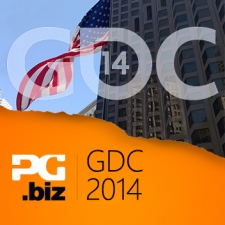On Tuesday, the 11th floor penthouse room of One Kearney in San Francisco played host to a panel of bright-eyed people, apparently no worse for wear after a night of GDC revelry and networking.
Sitting on the panel was App Annie's Bertrand Schmitt, Chartboost's Maria Alegre, Unity's David Helgason, and Ben Liu from Pocket Gems.
These four influential industry figures (gathered in a city that, thanks to GDC, is the centre of the mobile universe right now) were here to debate current and future trends - and Liu quickly cut to the core of the issue
"Mobile gaming as we know it is going to be dead in a couple of years," detailed Liu.
He'd eventually clarify his point for the room, but it was clear that those in attendance shared Liu's opinion that the industry is ripe for change.
The great beyond
To understand Liu's point in context, it's important to view death not as a terminal event, but as more of a transitional phase not unlike one would with a tarot card.
Taken this way, it's easy to see how mobile gaming as we know it is dying.
Bertrand Schmitt rattled off a few quick figures to provide context on the modern gaming scene: Japan now generates more mobile revenue than the United States, Android's outpaced iOS as the most popular global platform, and developers are now actively seeing BRIC (Brazil, Russia, India, and China) nations as robust streams of revenue.
Maria Alegre - co-founder of Chartboost - meanwhile drew attention to the changing definition of what it means to be a gamer with the increasingly prodigious penetration of smartphones and tablets.
"Being a gamer no longer defines you, it's now just something that everyone does - you can play games with your grandmother," stated Alegre.
But it's not just the older generation thats joining the fold - pointing to the 620,000 developers who've used Unity in the past 30 days, David Helgason noted that "even nine-year-olds-are building games."
"It's an exciting time to be a game developer right now", Alegre finished.
The evolution of distribution
With all of the changes coming to mobile gaming, it makes sense that distribution and user acquisition would change as well.
"Word of mouth is the strongest way for an app to be discovered," Helgason began, and quickly referenced his company's recent acquisition of Everyplay creator Applifier.
Alegre quickly followed up this point with her own assessments on video - an arena that Chartboost recently entered.
"Video is a powerful way to communicate why a game is cool, because you can go right to the fun part of the game and show people why it's fun to play."
Liu, meawhile, took a more philosophical approach.
"We're in a really pure state of the world right now where the best product wins," he began, stressing the need for engaging and creative new content. "You can't replicate the success of word-of-mouth campaigns with any amount of money."
Schmitt, meanwhile, disagreed with Helgason's word of mouth assessment - at least, in regards to Asian markets.
"You need to start with the best product, but the best companies go crazy into advertising. In Japan, you can't crack the top 10 without spending a lot of money on advertising campaigns."
Mobile gaming is dead, long live mobile gaming
When asked to clarify his statement that mobile gaming as we know it is going to "be dead in a couple of years", Liu didn't attempt to change his position.
"Going forward, we're going to see things that were made for mobile first- that are made to facilitate interactions and gameplay on mobile that haven't been done before," he detailed. "There are many types of games that havent been invented or created yet."
Liu then pointed to Pocket Gems recently launched interactive story app, Episode, as a prime example of this trainsition.
"There are a lot of things that havent been done yet that are coming," Liu concluded.
Also coming is, perhaps, the day when a small team launches a game to the order, scale, and grandeur of BioShock Infinite. When asked how close the industry was to seeing a BioShock Infinite built by "a couple of guys in a garage", Helgason was optimistic.
"We're pretty damn close - the technology that went into that game is pretty much bundled up in Unity, and then it's just a question of time and energy. It takes a lot of time to put that kind of art into a game, but we're seeing very high quality games being built by teams of 10 people."





















